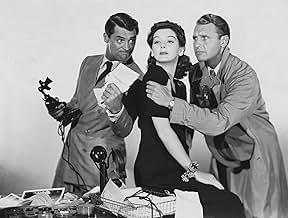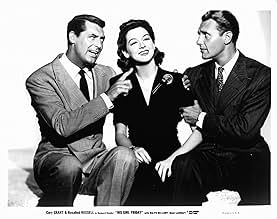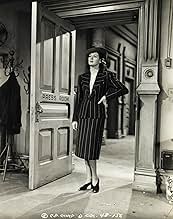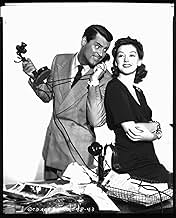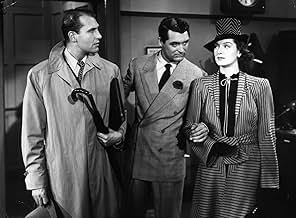Un editor de periódico intenta evitar por todos los medios que su exmujer, una experta reportera, se vuelva a casar.Un editor de periódico intenta evitar por todos los medios que su exmujer, una experta reportera, se vuelva a casar.Un editor de periódico intenta evitar por todos los medios que su exmujer, una experta reportera, se vuelva a casar.
- Dirección
- Guionistas
- Elenco
- Premios
- 5 premios ganados y 1 nominación en total
Opiniones destacadas
When I learned about Howard Hawkes screwball comedy "His Girl Friday," one of the biggest attractions, I was told, was the fast-paced/overlapping dialogue. During this time in Hollywood, dialogue would only be spoken by one person at a time. "His Girl Friday" was one of the first films to have characters speaking at the same time, often over one another; this would create an environment that was more realistic, especially in a place such as a newspaper room. Well, if that's what Hawkes was going for, he certainly achieved it.
The best thing about the film IS the dialogue. Characters speak at a break-neck speed, throwing witticisms left and right as if they were candy. Many times, while one is laughing at one joke, they would miss another right after it. That is how quickly the jokes are thrown out in the film. Cary Grant and Rosalind Russell are great at spilling lines out seemingly without any problem. It's a real testament to how professional these two were (along with the rest of the cast) with the amount of verbal meat they had to chew; I can't think of an actor today that could possibly pull of the kind of dialogue that was given in this film.
The problem that I had with the film was that the dialogue was the ONLY great thing about it. Unfortunately, the characters and situations presented in the film had little sympathy and lack of any kind of real depth. The situation with the falsely accused murderer was handled poorly given the context of his predicament; instead of really caring about this person and really trying to help him become cleared of charges, the Grant and Rosalind characters instead used him for their own purposes in getting "the big scoop." Now, of course one can argue that that WAS the reason they treated him the way they did, my issue is that such a serious subject was handled in a supposed "comedic" fashion; as if it was OK that this falsely accused person can be treated in such a horrible way, simply because it handled comedically. The last-second deus ex machina that sealed this person's fate supports the idea that his story wasn't really handled with any kind of importance.
The thing the really hurt the film was the love triangle between the Grant and Rosalind characters, and the Rosalind's character's fiancé. We are told in the beginning of the film that Grant and Rosalind are divorcees, and Rosalind is set to marry her fiancé the very next day in Albany. Of course, in a film like this, we are supposed to root for the Grant and Rosalind characters to get together at the end. the problem is, the Grant character is such a manipulative creep that at the end of the film I found myself actually rooting for the fiancé to the win the girl. Three times in the movie, the Grant character manipulates the situation, causing the fiancé to be thrown in jail, and preventing the would-be married couple from leaving the city. This in turn gives the Grant character enough time to convince Rosalind that she will always be "a newspaperman." The Rosalind character isn't much better either. Throughout the beginning of the film, she keeps explaining to others that she is through with the newspaper business, that she wants to settle down, raise a family, and not have to deal with the daily grind of hunting down a story. Well, does settling down and having a family sound like a bad thing to you? I didn't think so. Every time she tries to leave, she gets bogged down and distracted by the story (many times through the very fault of the Grant character). It gets so bad, that when the fiancé comes to her, begging her to leave with him, she brushes him off like a fly, barely acknowledging him. Even worse, when the fiancé's mother comes into play, the Rosalind character actually ALLOWS Grant to have her kidnapped and taken away! "His Girl Friday" would've worked if the filmmakers had cared enough about the characters than they did about the dialogue. The actor playing the fiancé did a thankless job; without much to work with, he actually created a character we cared about more so than the two leads. Sure he was a little simple, but that's a lot more than can be said about the other two. At the end of the film, I thought to myself "these two characters were divorced before the film started. Based on all the manipulative actions these two had throughout the story, is there any evidence that they'll stay together once the movie is over?" Maybe they deserve each other, because they certainly don't deserve anyone else.
The best thing about the film IS the dialogue. Characters speak at a break-neck speed, throwing witticisms left and right as if they were candy. Many times, while one is laughing at one joke, they would miss another right after it. That is how quickly the jokes are thrown out in the film. Cary Grant and Rosalind Russell are great at spilling lines out seemingly without any problem. It's a real testament to how professional these two were (along with the rest of the cast) with the amount of verbal meat they had to chew; I can't think of an actor today that could possibly pull of the kind of dialogue that was given in this film.
The problem that I had with the film was that the dialogue was the ONLY great thing about it. Unfortunately, the characters and situations presented in the film had little sympathy and lack of any kind of real depth. The situation with the falsely accused murderer was handled poorly given the context of his predicament; instead of really caring about this person and really trying to help him become cleared of charges, the Grant and Rosalind characters instead used him for their own purposes in getting "the big scoop." Now, of course one can argue that that WAS the reason they treated him the way they did, my issue is that such a serious subject was handled in a supposed "comedic" fashion; as if it was OK that this falsely accused person can be treated in such a horrible way, simply because it handled comedically. The last-second deus ex machina that sealed this person's fate supports the idea that his story wasn't really handled with any kind of importance.
The thing the really hurt the film was the love triangle between the Grant and Rosalind characters, and the Rosalind's character's fiancé. We are told in the beginning of the film that Grant and Rosalind are divorcees, and Rosalind is set to marry her fiancé the very next day in Albany. Of course, in a film like this, we are supposed to root for the Grant and Rosalind characters to get together at the end. the problem is, the Grant character is such a manipulative creep that at the end of the film I found myself actually rooting for the fiancé to the win the girl. Three times in the movie, the Grant character manipulates the situation, causing the fiancé to be thrown in jail, and preventing the would-be married couple from leaving the city. This in turn gives the Grant character enough time to convince Rosalind that she will always be "a newspaperman." The Rosalind character isn't much better either. Throughout the beginning of the film, she keeps explaining to others that she is through with the newspaper business, that she wants to settle down, raise a family, and not have to deal with the daily grind of hunting down a story. Well, does settling down and having a family sound like a bad thing to you? I didn't think so. Every time she tries to leave, she gets bogged down and distracted by the story (many times through the very fault of the Grant character). It gets so bad, that when the fiancé comes to her, begging her to leave with him, she brushes him off like a fly, barely acknowledging him. Even worse, when the fiancé's mother comes into play, the Rosalind character actually ALLOWS Grant to have her kidnapped and taken away! "His Girl Friday" would've worked if the filmmakers had cared enough about the characters than they did about the dialogue. The actor playing the fiancé did a thankless job; without much to work with, he actually created a character we cared about more so than the two leads. Sure he was a little simple, but that's a lot more than can be said about the other two. At the end of the film, I thought to myself "these two characters were divorced before the film started. Based on all the manipulative actions these two had throughout the story, is there any evidence that they'll stay together once the movie is over?" Maybe they deserve each other, because they certainly don't deserve anyone else.
Charles McArthur and Ben Hecht met when both were reporters in Chicago during the 1920s. They created two of the funniest farces in American drama, TWENTIETH CENTURY (about theater people) and THE FRONT PAGE. The latter was based on their experiences as news reporters in those crazy days in Chicago, where the newspapers concentrated on sensationalism and the politics was thoroughly corrupt. The resulting play is hysterically funny and yet remains timely. For all the exaggeration of how Walter Burns and Hildy Johnson manipulate police, politicians, reporters, and civilians to get their scoop, the story remains relevant for several reasons. The political balance in a big Mayoralty election is precarious due to the Earl Williams case. Williams has shot a policeman who is African-American, a big local voting block, and they want him punished. The corrupt Mayor and his idiot jail warden are willing to execute him for the votes needed to stay in office, but the Governor (who is from the rival party) believes the killer is insane (or at least mentally deficient). So already (as you see) race, politics, and the validity of the death penalty get pulled in. Soon we also see examples of nepotism and corruption in the police, and City Hall, cynical politics based on a man's life, and questions about privacy and a free press. For a play from 1931 this one still has relevance.
There had been an earlier version of the play in the 1930s called THE FRONT PAGE, starring Adolphe Menjou as the conniving and devious Walter Burns, and Pat O'Brien as ace reporter Hildy Johnson. It is a good version, and both stars do well with their parts (and both have the verbal speed necessary for the dialog to flow over the ears of the audience). But when the film was remade in 1940, Howard Hawks decided to redraw Hildy Johnson into a female reporter (and previous wife) of Burns. His casting of Cary Grant was radically different too. Burns is a nasty, conniving s.o.b. who would kill for a good story. Menjou was somewhat dapper (he was usually dapper) in the role, but the hardness under the presentable shell was there. And by changing Hildy from a guy to a gal, and Walter's former wife, you had to make Walter look more interesting. So Walter is turned into Cary Grant. There was a search for Hildy, involving Jean Arthur and Irene Dunne as possibilities. Neither ended up playing him. Instead it went to Rosalind Russell.
It has to be admitted Russell had the vocal abilities to push the dialog at the proper clip. Possibly Jean Arthur could have done that just as well, but Arthur did not have the apparent physical strength behind the stylishness that Russell showed. She really does balance well (in this film) with Grant, given their characters.
Motivation changes a little. This Walter Burns still wants to get his scoops, but there are moments of fragility when he realizes he may forever lose Hildy to her fiancé Bruce (the ever helpless Ralph Bellamy). And they oddly work (Hawks manages to keep them under control). Also, as the story is now twelve years older than the original play, certain changes occur in Walter's political views. He does dislike the gang (led by Clarence Kolb and Gene Lockhart) running the city, and points out to Hildy that they have a chance to help give the city the sort of government New York City has under La Guardia. This does not end his joy at scooping the opposition, but it does suggest that Burns has more depth.
It is now generally believed that this is the best of the film versions of THE FRONT PAGE, and one of the funniest films ever made. The entire cast shines (look at the scene where Helen Mack confronts the reporters who have made her look like a tramp, and have told lies about John Qualen (Williams) - she is in a state when Russell takes her out of the press room, and the reporters are thoroughly ashamed of herself - and Russell comes back looking at Regis Toomey, Porter Hall, and the others, and says "Gentlemen of the Press!" with heavy cynical irony). And also note Billy Gilbert's immortal Joe Pettibone, the most hopeless monument of total befuddlement in movies. It is one of the few film comedies of that period that retains it's laughs one viewing following another.
There had been an earlier version of the play in the 1930s called THE FRONT PAGE, starring Adolphe Menjou as the conniving and devious Walter Burns, and Pat O'Brien as ace reporter Hildy Johnson. It is a good version, and both stars do well with their parts (and both have the verbal speed necessary for the dialog to flow over the ears of the audience). But when the film was remade in 1940, Howard Hawks decided to redraw Hildy Johnson into a female reporter (and previous wife) of Burns. His casting of Cary Grant was radically different too. Burns is a nasty, conniving s.o.b. who would kill for a good story. Menjou was somewhat dapper (he was usually dapper) in the role, but the hardness under the presentable shell was there. And by changing Hildy from a guy to a gal, and Walter's former wife, you had to make Walter look more interesting. So Walter is turned into Cary Grant. There was a search for Hildy, involving Jean Arthur and Irene Dunne as possibilities. Neither ended up playing him. Instead it went to Rosalind Russell.
It has to be admitted Russell had the vocal abilities to push the dialog at the proper clip. Possibly Jean Arthur could have done that just as well, but Arthur did not have the apparent physical strength behind the stylishness that Russell showed. She really does balance well (in this film) with Grant, given their characters.
Motivation changes a little. This Walter Burns still wants to get his scoops, but there are moments of fragility when he realizes he may forever lose Hildy to her fiancé Bruce (the ever helpless Ralph Bellamy). And they oddly work (Hawks manages to keep them under control). Also, as the story is now twelve years older than the original play, certain changes occur in Walter's political views. He does dislike the gang (led by Clarence Kolb and Gene Lockhart) running the city, and points out to Hildy that they have a chance to help give the city the sort of government New York City has under La Guardia. This does not end his joy at scooping the opposition, but it does suggest that Burns has more depth.
It is now generally believed that this is the best of the film versions of THE FRONT PAGE, and one of the funniest films ever made. The entire cast shines (look at the scene where Helen Mack confronts the reporters who have made her look like a tramp, and have told lies about John Qualen (Williams) - she is in a state when Russell takes her out of the press room, and the reporters are thoroughly ashamed of herself - and Russell comes back looking at Regis Toomey, Porter Hall, and the others, and says "Gentlemen of the Press!" with heavy cynical irony). And also note Billy Gilbert's immortal Joe Pettibone, the most hopeless monument of total befuddlement in movies. It is one of the few film comedies of that period that retains it's laughs one viewing following another.
This gloriously funny romp by Howard Hawks is rightly remembered as one of the fastest-talking movies ever made. Originally done as 'The Front Page', the play by Hecht and McArthur takes on new life here as the character of Hildy Johnson metamorphoses in this version to be a sparky woman (played by Rosalind Russell), former wife of the harassed columnist Walter Burns (played with characteristic bewilderment and charm by Cary Grant). Hildy is about to marry again, to the nice but dull Bruce Baldwin (played by Ralph Bellamy as a character so boring he 'is like Ralph Bellamy' - how Hollywood liked its in-jokes).
With that fire-cracking script, a sizable amount of sparks between Grant and Russell, and good support from Bellamy and a cast which includes Gene Lockhart, Cliff Edwards, Clarence Kolb, and Regis Toomey, 'His Girl Friday' is one of those classic gems which never age and which remain hugely entertaining.
With that fire-cracking script, a sizable amount of sparks between Grant and Russell, and good support from Bellamy and a cast which includes Gene Lockhart, Cliff Edwards, Clarence Kolb, and Regis Toomey, 'His Girl Friday' is one of those classic gems which never age and which remain hugely entertaining.
10TuckMN
This screen adaptation of the Ben Hecht and Charles MacArthur play "The Front Page" was adapted for the talents of Cary Grant and Rosalind Russell -- there is no such character as Hildy Johnson (Russell) in that play.
Director Howard Hawks wanted to show the whirlwind pace of the newsroom in the criminal courts system so he had his actors overlap their lines -- so much so that at times it seems as though everyone is talking at once; it even gets difficult to understand all that is going on.
He also had the cast move FAST so the film looks totally frenetic from scene to scene with no respite -- either from the laughs or from the action.
There are two really good "inside" jokes in the script: The first is where Walter Burns (Grant) is describing Hildy's fiancee and says that "he looks like that guy in the movies -- Bellamy," Well, it WAS Ralph Bellamy playing that part!
The other is when Burns says something about someone he once knew named "Archie Leach" which just happens to be Cary Grant's real name.
This is one of the true gems of Hollywood's most prolific era. It has incredible pacing, acting, photography and an authentic gritty feeling that would be associated with hard-boiled, "anything for a story" newspaper people.
It has long been one of my favorite films and deserves to be watched over and over again -- just for all the dialogue and great acting that may have gone by so fast you missed it the first time.
Director Howard Hawks wanted to show the whirlwind pace of the newsroom in the criminal courts system so he had his actors overlap their lines -- so much so that at times it seems as though everyone is talking at once; it even gets difficult to understand all that is going on.
He also had the cast move FAST so the film looks totally frenetic from scene to scene with no respite -- either from the laughs or from the action.
There are two really good "inside" jokes in the script: The first is where Walter Burns (Grant) is describing Hildy's fiancee and says that "he looks like that guy in the movies -- Bellamy," Well, it WAS Ralph Bellamy playing that part!
The other is when Burns says something about someone he once knew named "Archie Leach" which just happens to be Cary Grant's real name.
This is one of the true gems of Hollywood's most prolific era. It has incredible pacing, acting, photography and an authentic gritty feeling that would be associated with hard-boiled, "anything for a story" newspaper people.
It has long been one of my favorite films and deserves to be watched over and over again -- just for all the dialogue and great acting that may have gone by so fast you missed it the first time.
Apparently Howard Hawks must've assumed that Cary Grant could carry off even the most abrasive of lead roles. Sure, Grant specialized in snappy banter with a caustic touch, but it was usually balanced with self-deprication and an unrealistic modesty. Unfortunately, none of that humanity is present here, just endless, overlapping sniping, arguing and scheming, at ninety miles a minute. How anyone can muster any sympathy for Grant's character is beyond me.
The crossfire dialogue is occasionally relieved by stretches of tedium. Rosalind Russell is charming and bright, and Ralph Bellamy does the best he can with what he's given. While there may be occasional touches of wit and good characterizations from the actors, His Girl Friday is one of the most irritating of Howard Hawks' films.
The crossfire dialogue is occasionally relieved by stretches of tedium. Rosalind Russell is charming and bright, and Ralph Bellamy does the best he can with what he's given. While there may be occasional touches of wit and good characterizations from the actors, His Girl Friday is one of the most irritating of Howard Hawks' films.
¿Sabías que…?
- TriviaIt is estimated that the normal rate of verbal dialogue in most films is around 90 words a minute. In Ayuno de amor (1940), the delivery has been clocked at 240 words a minute.
- ErroresWhen Bruce Baldwin comes to the press room late in the movie, an electric fan and small shelf on the wall to the left of the door both completely disappear. Both have been there in all previous scenes and both reappear after this scene.
- Citas
[describing Bruce]
Walter Burns: He looks like that fellow in the movies - Ralph Bellamy.
- Créditos curiososOpening credits prologue: It all happened in the "Dark Ages" of the newspaper game--when to a reporter "Getting that story" justified anything short of murder.
Incidentally you will see in this picture no resemblance to the man and woman of the press today.
Ready?
Well, once upon a time - -
- ConexionesEdited into Esto es todo (2009)
Selecciones populares
Inicia sesión para calificar y agrega a la lista de videos para obtener recomendaciones personalizadas
Detalles
- Fecha de lanzamiento
- País de origen
- Idiomas
- También se conoce como
- His Girl Friday
- Locaciones de filmación
- Productora
- Ver más créditos de la compañía en IMDbPro
Taquilla
- Total a nivel mundial
- USD 330
- Tiempo de ejecución1 hora 32 minutos
- Color
- Relación de aspecto
- 1.37 : 1
Contribuir a esta página
Sugiere una edición o agrega el contenido que falta

Principales brechas de datos
What is the Japanese language plot outline for Ayuno de amor (1940)?
Responda


